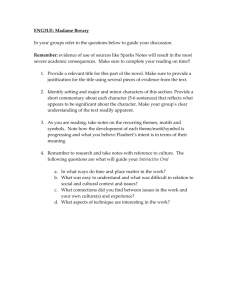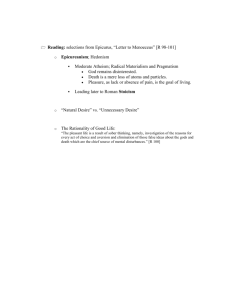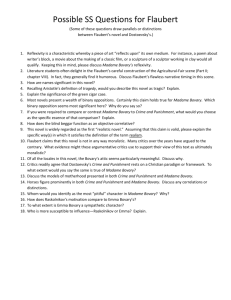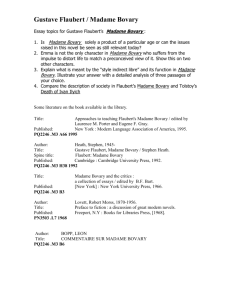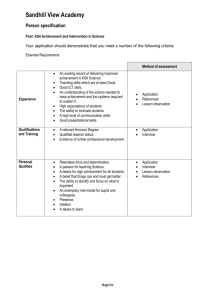Dialectics of Desire—Between Art, Nature, Morality Whereas the 18
advertisement
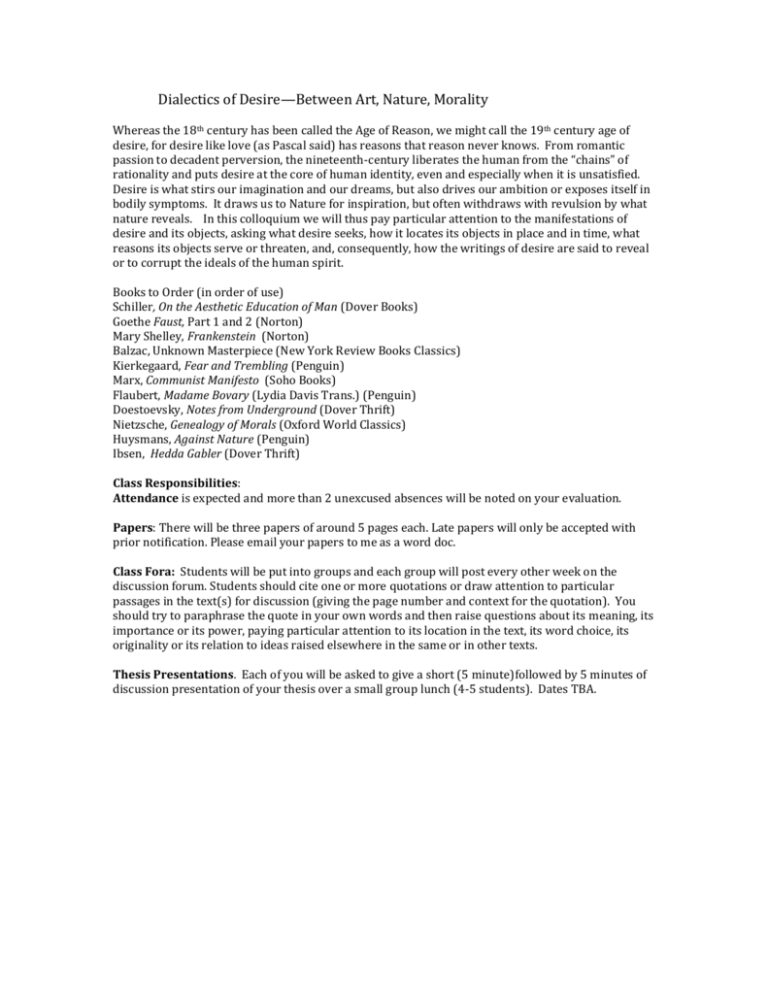
Dialectics of Desire—Between Art, Nature, Morality Whereas the 18th century has been called the Age of Reason, we might call the 19th century age of desire, for desire like love (as Pascal said) has reasons that reason never knows. From romantic passion to decadent perversion, the nineteenth-century liberates the human from the “chains” of rationality and puts desire at the core of human identity, even and especially when it is unsatisfied. Desire is what stirs our imagination and our dreams, but also drives our ambition or exposes itself in bodily symptoms. It draws us to Nature for inspiration, but often withdraws with revulsion by what nature reveals. In this colloquium we will thus pay particular attention to the manifestations of desire and its objects, asking what desire seeks, how it locates its objects in place and in time, what reasons its objects serve or threaten, and, consequently, how the writings of desire are said to reveal or to corrupt the ideals of the human spirit. Books to Order (in order of use) Schiller, On the Aesthetic Education of Man (Dover Books) Goethe Faust, Part 1 and 2 (Norton) Mary Shelley, Frankenstein (Norton) Balzac, Unknown Masterpiece (New York Review Books Classics) Kierkegaard, Fear and Trembling (Penguin) Marx, Communist Manifesto (Soho Books) Flaubert, Madame Bovary (Lydia Davis Trans.) (Penguin) Doestoevsky, Notes from Underground (Dover Thrift) Nietzsche, Genealogy of Morals (Oxford World Classics) Huysmans, Against Nature (Penguin) Ibsen, Hedda Gabler (Dover Thrift) Class Responsibilities: Attendance is expected and more than 2 unexcused absences will be noted on your evaluation. Papers: There will be three papers of around 5 pages each. Late papers will only be accepted with prior notification. Please email your papers to me as a word doc. Class Fora: Students will be put into groups and each group will post every other week on the discussion forum. Students should cite one or more quotations or draw attention to particular passages in the text(s) for discussion (giving the page number and context for the quotation). You should try to paraphrase the quote in your own words and then raise questions about its meaning, its importance or its power, paying particular attention to its location in the text, its word choice, its originality or its relation to ideas raised elsewhere in the same or in other texts. Thesis Presentations. Each of you will be asked to give a short (5 minute)followed by 5 minutes of discussion presentation of your thesis over a small group lunch (4-5 students). Dates TBA. Syllabus 1/24 Kant, “What is Enlightenment,”(1784); Coleridge “Kubla Khan”(1797), “Rime of the Ancient Mariner” ( 1797-8), “To A Young Ass;” Wordsworth, “Tintern Abbey”(1798), “The World is Too Much With Us”(1806). 1/29 Schiller, “On the Aesthetic Education of Man”(1795), Letters 1-13 1/31 Schiler, (cont.) Letters 14-end. 2/5 Hegel, Phenomenology of Spirit,(1807) “Preface” and “Self-Consciousness” (excerpt) 2/7 Hegel, On the Philosophy of Fine Art (Lectures 1818-29), (Introduction), 2/12 Goethe, Faust I (1808) 2/14 Goethe, Faust II (1832) 2/19 Shelley, Frankenstein (1818) 2/21 Balzac, “Unknown Masterpiece” (1832) 2/26 Kierkegaard, “Fear and Trembling” (1843) Preface-Preamble from the Heart 2/28 Kierkegaard, Problema I-III and Epilogue First Paper Due 3/1 3/5 Marx, Communist Manifesto (1848), “Melville, Bartleby the Scrivener” (1853) 3/7 Baudelaire, selections from Flowers of Evil and Paris Spleen SPRING BREAK 3/26 Flaubert, Madame Bovary (1857) Part I, Part II, chaps 1-7 3/28 Madame Bovary Part II, chaps 8-15 4/2 Madame Bovary Part III 4/4 Mill, On Liberty (excerpts); On the Subjection of Women (excerpts); Darwin, On Origin of Species (1859) (Selections), 4/9 No Class 4/11Theses Due, No Class 4/16 Darwin, “On Descent of Man” (selections); Dostoevsky, Notes from Underground (1864), Part I 4/18 Dostoevsky, Notes from Underground, Part II Second Paper Due 4/19 4/23 Nietzsche, Geneology of Morals (1887) “Preface” and First and Second Essays 4/25 Nietzsche, Geneology of Morals, Third Essay 4/30 Huysmans, Against Nature (1884) Prologue and Chaps 1-10 5/2 Against Nature Chaps 10-end 5/7 Ibsen, Hedda Gabler (1890) Third Paper Due 5/17
